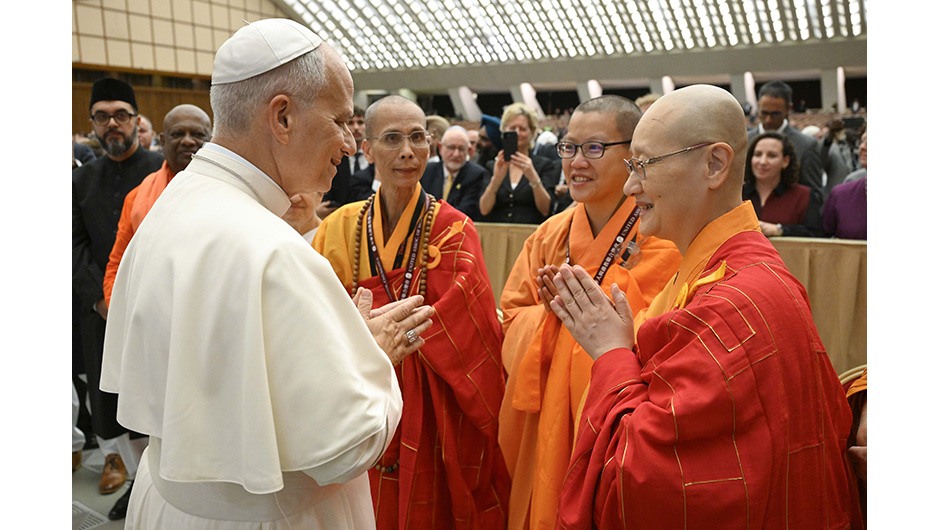VATICAN CITY — For the Catholic Church, interreligious dialogue “is not a tactic or a tool, but a way of life — a journey of the heart that transforms everyone involved, the one who listens and the one who speaks,” Pope Leo XIV said.
Dialogue is a journey that people walk “not by abandoning our own faith but by standing firmly within it,” he said. “For authentic dialogue begins not in compromise, but in conviction — in the deep roots of our own beliefs that give us the strength to reach out to others in love.”
Pope Leo made the remarks Oct. 28 at a nighttime celebration marking the 60th anniversary of “Nostra Aetate,” the Second Vatican Council’s declaration on relations with Judaism, Islam and other world religions.
The original document signed by St. Paul VI was placed on the stage in the Vatican audience hall for the event, along with an oil lamp from Assisi and an olive tree, a symbol of peace.
At the beginning of the event, more than 80 representatives of Christianity, Judaism, Islam, Hinduism, Jainism, Sikhism, Buddhism, Zoroastrianism, Confucianism, Taoism, Shintoism and African Traditional Religions filed into the hall behind a Sri Lankan Buddhist dance troupe and accompanied by children from an Italian choir.
Many of the leaders had personally greeted Pope Leo earlier in the evening at Rome’s Colosseum, where they took part in a meeting of religions for peace sponsored by the Community of Sant’Egidio.
About 400 of the 3,000 people in attendance were scholars participating in a three-day conference on “Nostra Aetate” at Rome’s Pontifical Gregorian University.
In his remarks, Pope Leo noted how the declaration began as a treatise “describing a new relationship between the Catholic Church and Judaism. We can say, therefore, that the fourth chapter, dedicated to Judaism, is the heart and generative core of the entire declaration.”
“For the first time in the history of the church, we have a doctrinal text with an explicitly theological basis that illustrates the Jewish roots of Christianity in a well-founded biblical manner,” the pope said. “At the same time, ‘Nostra Aetate’ takes a firm stand against all forms of antisemitism.”
The declaration “teaches that we cannot truly call on God, the Father of all, if we refuse to treat in a brotherly or sisterly way any man or woman created in the image of God,” Pope Leo said. “Indeed, the church rejects all forms of discrimination or harassment because of race, color, condition of life or religion.”
With “Nostra Aetate,” he said, “ a seed of hope for interreligious dialogue was planted. Today, your presence bears witness that this seed has grown into a mighty tree, its branches reaching far and wide, offering shelter and bearing the rich fruits of understanding, friendship, cooperation and peace.”
At the end of the evening, the children gave each participant a small bag of seeds, symbolizing the shared mission to continue planting seeds of dialogue and hope for future generations.
Pope Leo listed four teachings of “Nostra Aetate” that he said remain “highly relevant today”:
Sixty years after the church called people “to look beyond what separates us and to discover what unites us all,” he said, people struggle to do so.
“We see walls rising again — between nations, between religions, even between neighbors,” the pope said.
“The noise of conflict, the wounds of poverty and the cry of the earth remind us how fragile our human family remains,” Pope Leo said.
“As religious leaders, guided by the wisdom of our respective traditions,” he said, “we share a sacred responsibility: to help our people to break free from the chains of prejudice, anger and hatred; to help them rise above egoism and self-centeredness; to help them overcome the greed that destroys both the human spirit and the earth.”
When so many people are tempted to despair, Pope Leo said, religious leaders must “reawaken in all men and women their sense of humanity and of the sacred” and work “to keep hope alive, to keep dialogue alive and to keep love alive in the heart of the world.”
I was awakened on the morning of April 21 by a text, stunned out of sleep as I read a note of condolences from a Muslim friend on the passing of Pope Francis. Even in death, Pope Francis was revealing his impact on interreligious relations.
More than 6,000 religious leaders from around the country gathered at McCormick Place Aug. 14-18 for the Parliament of the World’s Religions, and many local Catholics also took part.
Daniel Gómez-Ibáñez, a former trustee, chair and executive director of the Parliament of the World’s Religions, was presented the inaugural Very Rev. Thomas A. Baima Global Ethic Award at the 2023 parliament at McCormick Place on Aug. 14.
Advertising
